2025
Liu's painting “Midnight Sun” is exhibited in the “Hidden Gems: 30th Anniversary Exhibition of the Ching Wan Society's Collection” at the National Museum of History.
Liu's painting “Five Sun” is exhibited in the “The Formosa Era: the Intellectual Enlightenment of Early Modern and Modern Art in Taiwan” at the Tainan Art Museum.
Liu's painting “Mountain Beyond Mountains” is exhibited in the “Arts as Imprints of the Times: Permanent Collection of the NTMoFA” at the National Taiwan Museum of the Fine Arts.
Liu's painting “Lofty Zigzag” is exhibited in “Fernando Zóbel: Order is essential,” held at National Gallery Singapore.
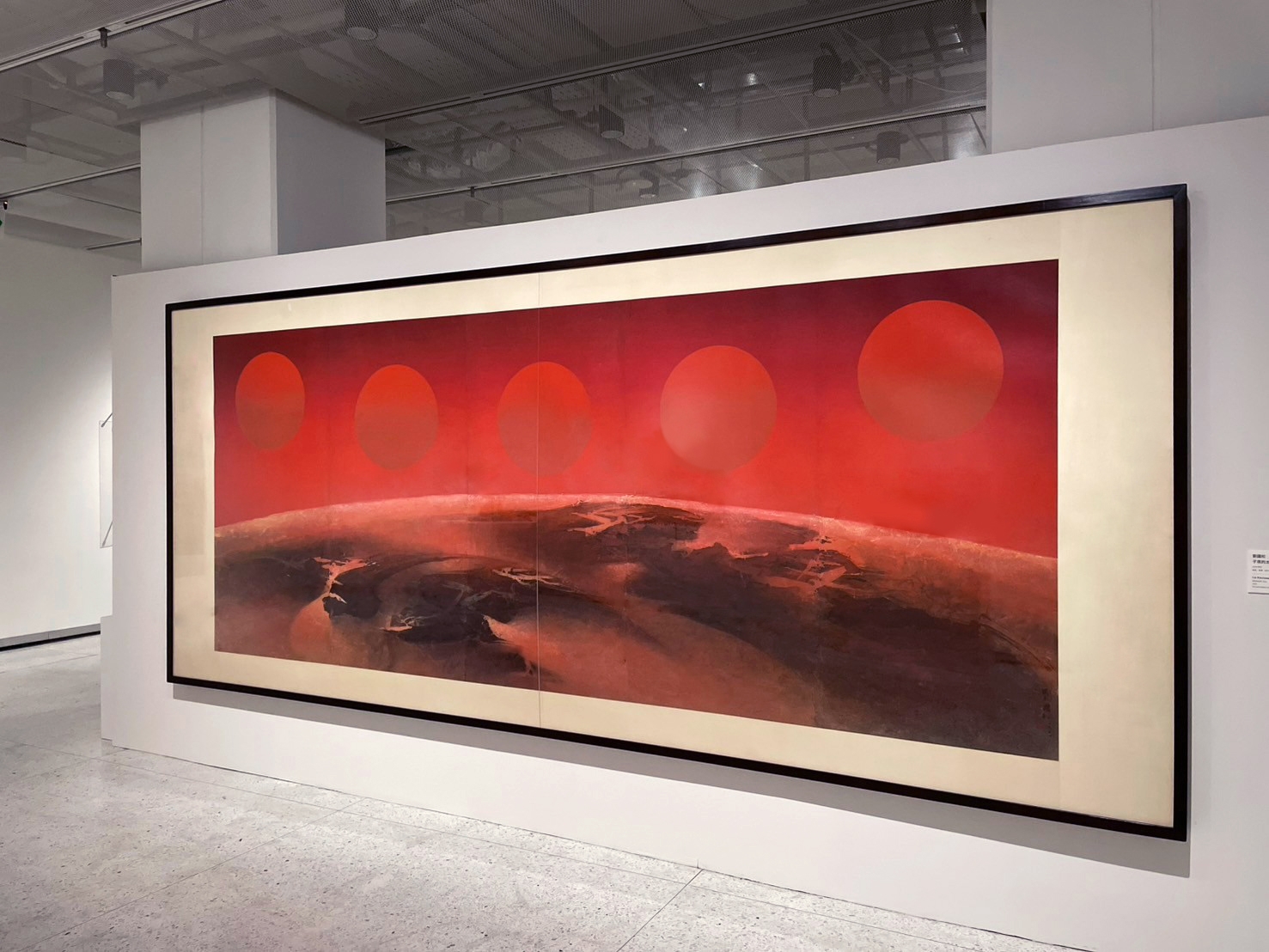 Liu's painting “Midnight Sun” was featured in the exhibition“Hidden Gems: 30th Anniversary Exhibition of the Ching Wan Society's Collection”
Liu's painting “Midnight Sun” was featured in the exhibition“Hidden Gems: 30th Anniversary Exhibition of the Ching Wan Society's Collection”
2024
Edited by Eugene Y. Wang, Valerie C. Doran, and Alan C. Yeung from Harvard University’s Chinese Art Media Lab (CAMLab), The Liu Kuo-sung Reader: Selected Texts on and by the Artist, 1950s–Present is published.
Liu is invited to participate in the exhibition “The Birth of Modernist Art Movement in Taiwan” at the National Museum of History; Liu's painting “Midnight Sun” is featured.
The artworks “Lofty Zigzag” and “Untitledr” are exhibited in “Zóbel: The Future of the Past,” held at the Ayala Museum.
Liu is invited to participate in the exhibition “Reimagining the Children's Encyclopedia”at the Taoyuan Children's Art Museum; Liu's painting “Mid-Autumn Moon” is featured.
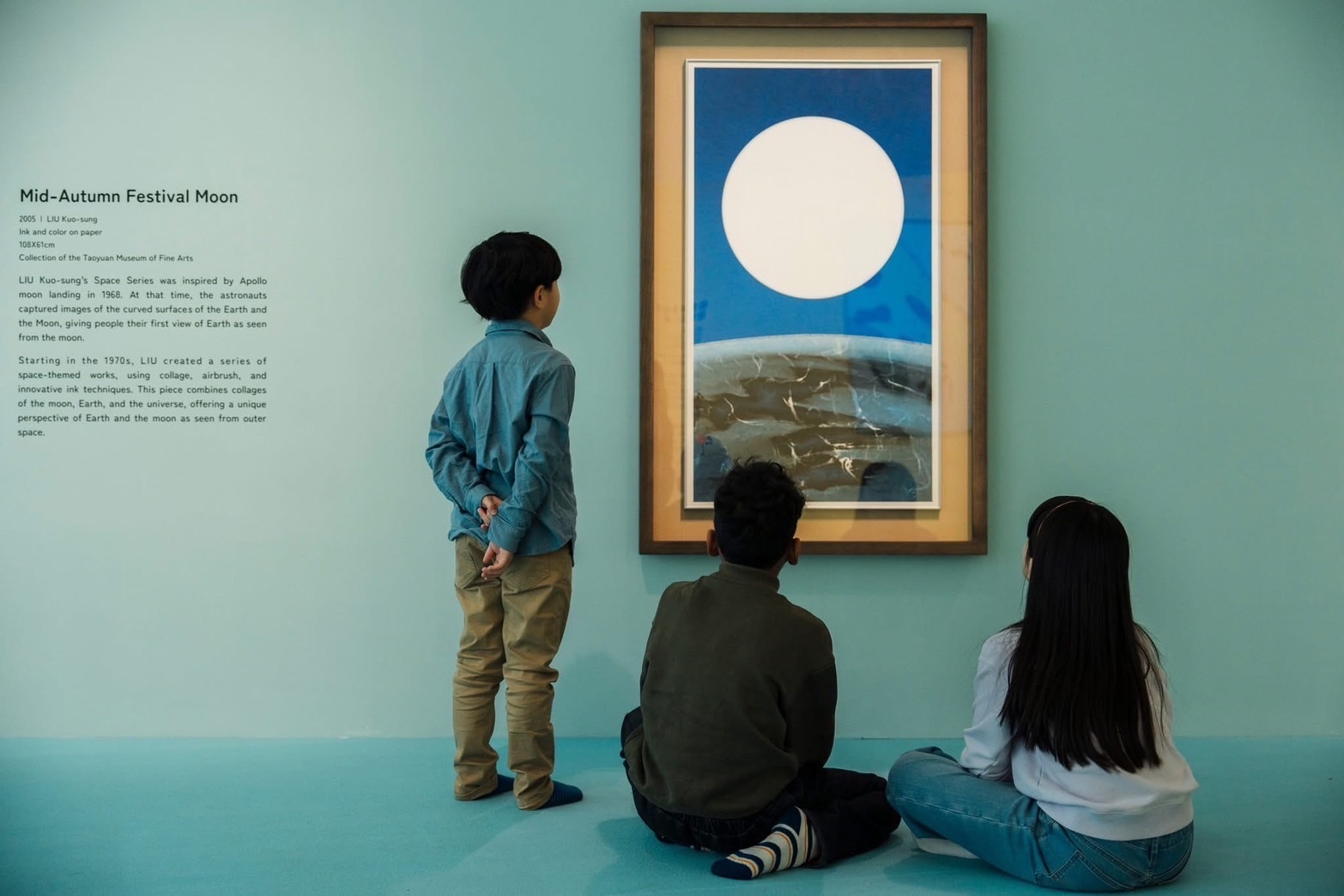 Liu's painting “Mid-Autumn Moon” was featured in the exhibition“Reimagining the Children's Encyclopedia” | photo courtesy of Taoyuan Children's Art Museum
Liu's painting “Mid-Autumn Moon” was featured in the exhibition“Reimagining the Children's Encyclopedia” | photo courtesy of Taoyuan Children's Art Museum
2023
“Liu Kuo-sung: Experimentation as Method” is held at the National Gallery Singapore.
Liu is invited to participate in the exhibition “Era of Principle and No Principle Interwoven: Calligraphy as a Visual Form” at the Hengshan Calligraphy Art Center; his painting “Let the Spirit Freely Wander, Let the Mind Be Pleased” is featured.
Liu is invited to participate in the exhibition “Art in Our Time: NTMoFA Collection Highlights” at the National Taiwan Museum of Fine Arts; his paintings “Mountain Beyond Mountains” and “Which is Earth No. 3” are featured.
He is awarded the Honorary Doctorate Degree in Fine Arts by National Taiwan Normal University.
The third “Liu Kuo-sung Ink Award” is co-presented in Hong Kong by The Liu Kuo-sung Archives and The Ink Society of Hong Kong.
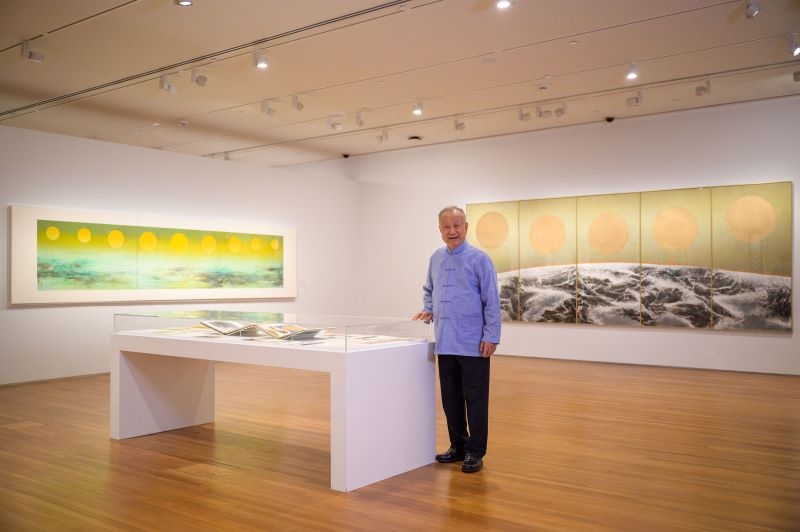 Liu at the exhibition “Liu Kuo-sung: Experimentation as Method” | photo courtesy of Nation Gallery Singapore
Liu at the exhibition “Liu Kuo-sung: Experimentation as Method” | photo courtesy of Nation Gallery Singapore
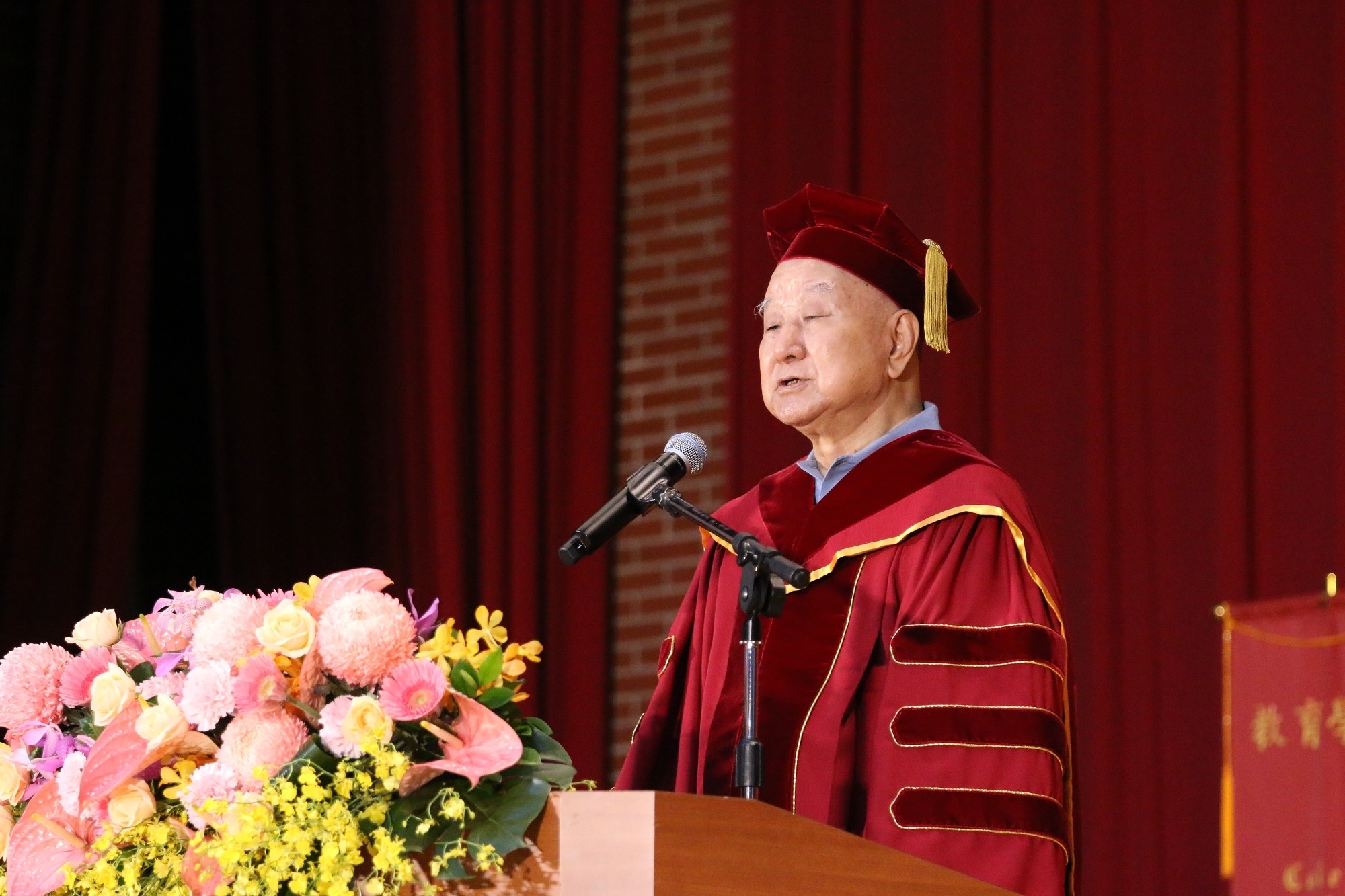 Liu addressed the audience at the degree conferral ceremony of NTNU | photo courtesy of NTNU
Liu addressed the audience at the degree conferral ceremony of NTNU | photo courtesy of NTNU
2022
Liu's artwork “Ring Centre (B)” is exhibited in the “Kathmandu Triennale 2077” at the Kathmandu Valley, Nepal.
The exhibition “Forging New Paths in Ink: An Exhibition of Liu Kuo-Sung Documents from the 1940s to the 1980s”at the Teh-Chun Art Gallery of NTNU.
The artwork Resilience In the Face of Wintry Conditions is exhibited in the “Inheritance and Paragon—NTNU Alumni Art Exhibition in Celebration of the Hundredth Anniversary,” held at the National Taiwan Normal University (NTNU) Art Museum.
The artwork “Snows Foliated upon Snows” is exhibited in the“A Tradition Redefined: Gifts from the Li Family Collection of Chinese Painting exhibition,” held at the Phoenix Art Museum.
The “Liu Kuo-sung Ink Art Award 2022: Special 90th Birthday Edition” organized by The Ink Society, was presented in Hong Kong.
2021
The artworks “Sea of Floating Ice,” “It'll Soon Be White All Over,” and “Dawn” are exhibited in “Ink Dreams: Selections from the Fondation INK Collection,” held at the Los Angeles County Museum of Art (LACMA).
The second“Liu Kuo-sung Ink Award” is co-presented in Hong Kong by The Liu Kuo-sung Archives and The Ink Society of Hong Kong.
Liu is invited to participate in the exhibition “Flying Ink: Hengshan International Calligraphy Art Exhibition” at the Hengshan Calligraphy Art Center; his painting “Universe is My Heart” is featured.
2020
The catalogue for the exhibition “Longing for Nature: Reading Landscapes in Chinese Art” at the Rietberg Museum in Zürich, Switzerland, features Liu's “Snow” on its cover.
2019
The inaugural "Liu Kuo-sung Ink Award" is co-presented in Hong Kong by the Liu Kuo-sung Archives and The Ink Society of Hong Kong.
The exhibition “To the Moon—Liu Kuo-sung” is mounted at the Kaohsiung Museum of Fine Arts in Kaohsiung, Taiwan.
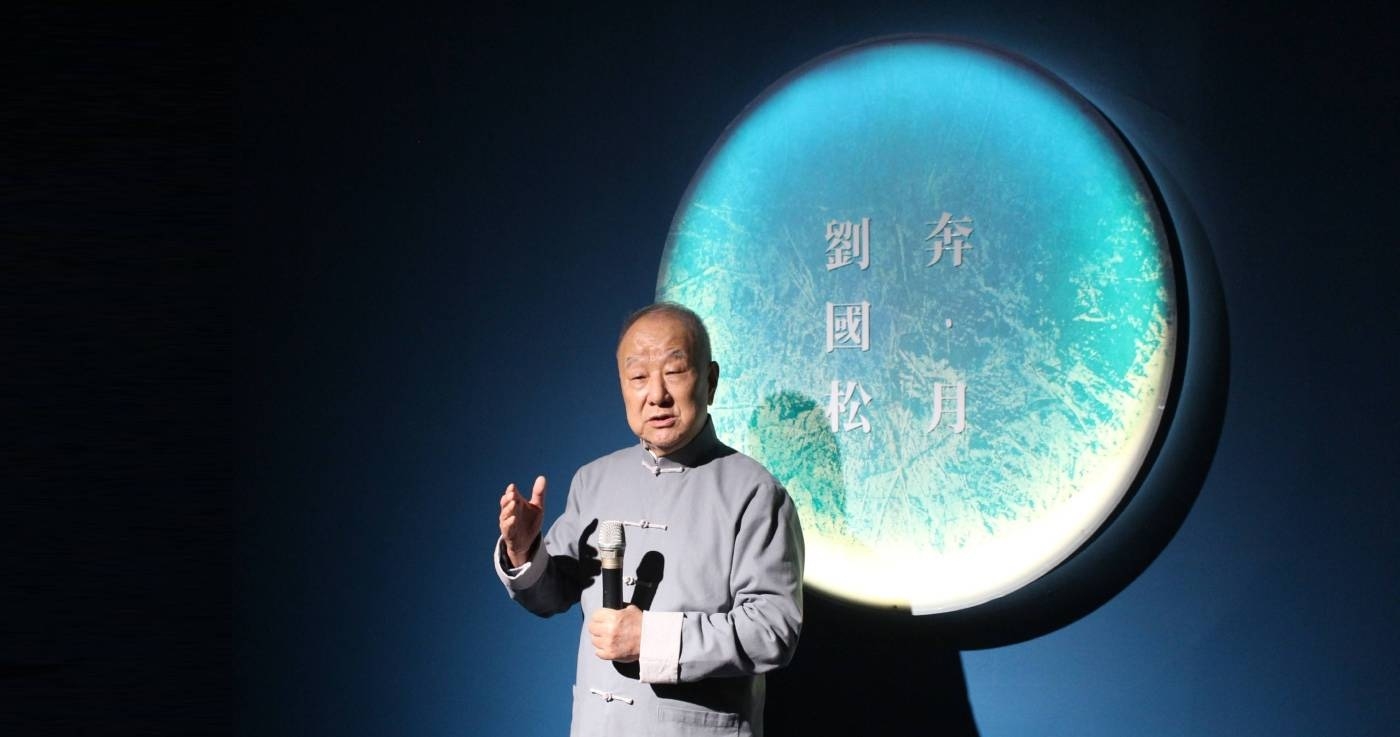 Liu Kuo-sung at the exhibition site | photo Courtesy of Kaohsiung Museum of Fine Arts
Liu Kuo-sung at the exhibition site | photo Courtesy of Kaohsiung Museum of Fine Arts
2018
Liu's artwork “Zen Dream” is exhibited in “Ink Worlds: Contemporary Chinese Painting from the Collection of Akiko Yamazaki and Jerry Yang,” held at the Cantor Arts Center, Stanford University, and is selected as the cover image for the exhibition catalog.
Liu is appointed as the inaugural dean of the newly founded Academy of Contemporary Ink Art at the Shanghai Institute of Visual Art.
He curates and participates in "Beyond Ink," a major ink concept art exhibition, as part of the series of events for the 20th China Shanghai International Arts Festival, organized by the Academy of Contemporary Ink Art at the Shanghai Institute of Visual Art.
2017
Awarded 36th Nation Cultural Award.
“Retrospective Exhibition of Liu Kuo-sung's Works of Art”in Shandong Museum, China.
2016
The exhibition “Echo of the Universe: Ink Art of Liu Kuo-sung” is mounted at the China Art Museum in Shanghai.
Becomes the first Chinese artist to be named a Foreign Honorary Member by the American Academy of Arts and Sciences.
Decorates with the “Order of Brilliant Star with Grand Cordon” by the R.O.C. government.
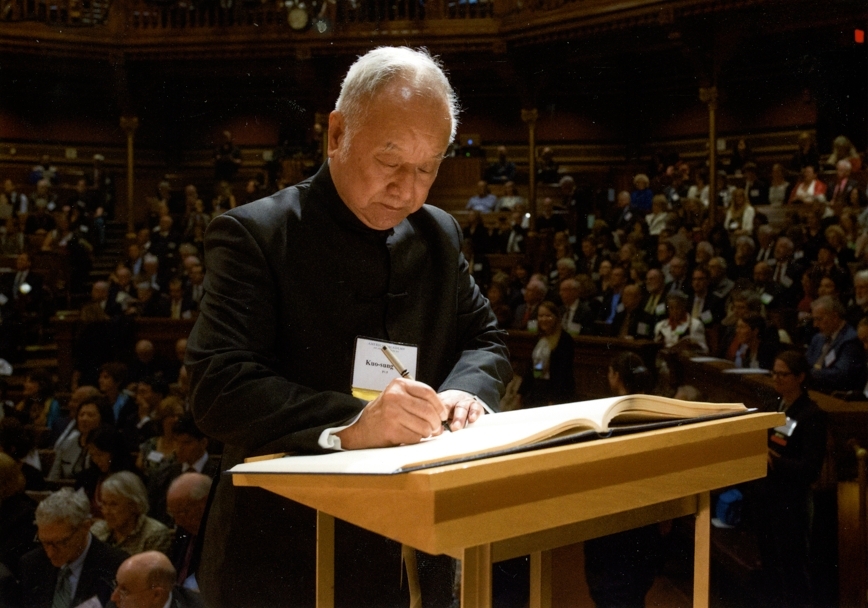 Liu is named a Foreign Honorary Member at the American College of Arts and Sciences, 2016.
Liu is named a Foreign Honorary Member at the American College of Arts and Sciences, 2016.
2015
Participates in “Ink Asia, the first art fair specialized in Chinese Ink Paintings” held in Hong Kong, and is invited to deliver the speech: “My Journey with Chinese Ink Painting.”
The exhibition “Revolution | Renaissance: The Art of Liu Kuo-Sung” is held as a Southeast Asia tour, showcasing at MoCA@LOEWEN, Singapore, the National Museum of Indonesia in Jakarta, and the Museum of Contemporary Art in Bangkok.
 Liu gave the speech on his journey with Chinese Ink Painting on 19 December 2015. From left to right are Pi Dao Jian, Liu Kuo-sung and Deng Min-liang.
Liu gave the speech on his journey with Chinese Ink Painting on 19 December 2015. From left to right are Pi Dao Jian, Liu Kuo-sung and Deng Min-liang.
2014
The exhibition “Revolution / Renaissance: The Art of Liu Kuo-sung” is mounted at the Taipei Museum of History; it later tours Southeast Asia.
2013
Featuring more than 80 works, the permanent “Liu Guosong Modern Ink Art Gallery” opens at the Shandong Museum in Jinan, China.
2012
“A Man of East, West, South and North-Liu Kuo-sung 80th Birthday Retrospective Exhibition” is mounted at the National Taiwan Museum of Fine Arts.
 Liu explains his art personally at his“80th Birthday Retrospective”Exhibition in March, 2012. Huang Tsai-langis on Liu's left side: Lin Jin-tian is on his right. Photo by Zhang Meng-qi.
Liu explains his art personally at his“80th Birthday Retrospective”Exhibition in March, 2012. Huang Tsai-langis on Liu's left side: Lin Jin-tian is on his right. Photo by Zhang Meng-qi.
 Liu's 80th Birthday Retrospective Exhibition at National Taiwan Museum of Fine Art in March, 2012. The front row starting from the right are Lee Chun-yi, Li Ming-zhen, Yang Du, Li Mo-hua , Liu Kuo-sung, Lin Jin-tian, Huang Tsai-lang and Yuan Jin-ta on the left; Back row from the left are Julia Andrews, Pi Dao-jian and Shen Kui-yi. Photo by Zhang Meng-qi
Liu's 80th Birthday Retrospective Exhibition at National Taiwan Museum of Fine Art in March, 2012. The front row starting from the right are Lee Chun-yi, Li Ming-zhen, Yang Du, Li Mo-hua , Liu Kuo-sung, Lin Jin-tian, Huang Tsai-lang and Yuan Jin-ta on the left; Back row from the left are Julia Andrews, Pi Dao-jian and Shen Kui-yi. Photo by Zhang Meng-qi
2011
Honored with the "Award for Lifetime Achievement" at the biannual China Arts Award organized by the Chinese National Academy of Arts, Beijing.
The exhibition Liu Kuo-sung: A 80-year Retrospective is mounted at the National Art Museum of China, Beijing.
The Spirit of Ink Painting—Biography of Liu Guosong, written by Hsiao Chong-Ray, is published by Taiwan Vista Publishing of New Taipei City, Taiwan.
2010
Solo exhibition was held at Goedhuis Contemporary in London, UK.
Liu's work “The Rise and Set of the Sun and Moon”was collected by British Museum.
Appointed Chair Professor at NTNU.
Awarded an honorary doctoral degree by California’s World Academy of Arts and Culture and the World Congress of Poets.
 1970, "Sun and Moon Floating Sinking", 57.2 x 94.2 cm
1970, "Sun and Moon Floating Sinking", 57.2 x 94.2 cm
2009
The retrospective The Universe in the Mind: 60 Years of Painting by Liu Guosong continues to travel to the Hubei Provincial Museum, the Ningxia Museum, the Three Gorges Museum in Chongqing and the Yaming Art Museum in Hefei, all in China.
The University Museum and Art Gallery of The University of Hong Kong hosts the exhibition The Universe in the Mind: Liu Guosong's Art and Thoughts, and publishes a monographic catalogue by Lee Chun-yi to accompany the show.
2008
He received“The 12th Annual National Award for Arts”of Taiwan.
2007
The retrospective The Universe in the Mind: 60 Years of Painting by Liu Guosong takes place at The Hall of Martial Valor (Wuying dian) at The Palace Museum in Beijing, China.
The monograph Liu Guosong's Road to Modern Chinese Painting, written by art historian Lin Mu, is published.
 The opening of“Universe in the Mind: 60 Years of Paintings by Liu Guosong”, Liu with the guests.
The opening of“Universe in the Mind: 60 Years of Paintings by Liu Guosong”, Liu with the guests.
2006
The exhibition Rhythm of Mind travels from Zhejiang Provincial Museum and Zhejiang Westlake Gallery, both in Hangzhou, to Hunan Museum in Changsha, all in China.
The large-scale landscape Tianzishan in Summer: Zhangjiajie Series No. 9 is acquired by The Palace Museum in Beijing, China.
2005
Invited by Michael Sullivan to participate in the "Modern Chinese Painting" symposium at Oxford University, UK.
2004
The major retrospective LIU GUO SONG: A Universe of His Own is mounted at the Hong Kong Museum of Art.
Named an emeritus professor by the Tainan National University of the Arts in Tainan, Taiwan.
2003
“Liu Kuo-sung at 70”exhibition at Hanart T Z Gallery in Hong Kong.
2002
The solo show The Universe in the Mind: A Retrospective of Liu Kuo-sung at 70 travels to Beijing's National Museum of China, the Shanghai Art Museum and Guangzhou's Guangdong Museum of Art, all in China.
Awarded“Outstanding Alumni”by the National Taiwan Normal University.
 Liu's two daughters celebrating their father's birthday in Shanghai.
Liu's two daughters celebrating their father's birthday in Shanghai.
2000
Invited to lecture at Tibet University in Lhasa, Tibet; Liu visits Mount Everest, and loses hearing in his left ear.
Liu Kuo-sung—Yu Kwang-chung: Reflection and Elegance is published by Hebei Education Publishing House in Shijiazhuang, China.
Between 2000 to 2001, Liu makes several visits to Jiuzhaigou in China's Sichuan Province; moved by the beauty of the landscape, he starts to experiment with new techniques to create the Jiuzhaigou series.
 Liu travelled to Jiuzhaigou, Sichuan, China from the end of 2000 to the beginning of 2001; the trip inspired him to use his ink steeping technique to capture the colours of the landscape.
Liu travelled to Jiuzhaigou, Sichuan, China from the end of 2000 to the beginning of 2001; the trip inspired him to use his ink steeping technique to capture the colours of the landscape.
1999
At the invitation of the National Dr. Sun Yat-sen Memorial Hall in Taipei, the one-man show The Universe and My Heart opens at the Chung Shan Gallery in Taiwan.
Is invited to Paris to collaborate with Taiwanese poet Yu Kwang-chung on a collection of prints entitled Poetry in Painting; a book is published featuring six of Liu’s works, each accompanied by a poem by Yu; the calligraphy on the cover is by Nanjing-born calligrapher Chang Long-yien.
1998
Liu is the only artist from Taiwan invited to participate in the exhibition China: 5000 Years at The Guggenheim in New York, USA and the Guggenheim Museum Bilbao, Spain.
The German textbook Brücken und Brüche: Chinas Malerei im 20. Jahrhundert (Bridges and Fractures: China's Painting in the Twentieth Century) features Liu's painting High Cliff on its cover; the authors also write about Liu's influence on the evolution of contemporary Chinese painting.
 Liu Kuo-sung was invited to show in "China 5000 Years" at the Guggenheim Museum, Bibao, Spain,1998.
Liu Kuo-sung was invited to show in "China 5000 Years" at the Guggenheim Museum, Bibao, Spain,1998.
1997
He was invited to participate in“Chinese Art Exhibition”and conference at the Shanghai Art Museum.
1996
Appointed as the inaugural head of the Fine Arts Research Institute at the Tainan National College of the Arts (now Tainan National University of the Arts) in Taiwan.
The Taipei Museum of History, Taiwan, mounts An Exhibition of Liu Kuo-sung's Art and its Studies. To accompany the show, the museum publishes art historian Hsiao Chong-ray's Liu Kuo-sung Research and Liu Kuo-sung Essays(Selected Essays on Liu Kuo-sung), an anthology edited by artist Lee Chun-yi.
Guangxi Fine Arts Publishing House in Nanning, China publishes Chen Lvsheng's A Study of Liu Kuo-sung(Liu Kuo-sung: A Critical Biography).
1995
Participates in the exhibition Twentieth Century Chinese Painting: Tradition and Innovation at the Hong Kong Museum of Art; the show subsequently travels to the British Museum in London; the Singapore Art Museum in Singapore; and The Museum of East Asian Art in Cologne.
1992
Invited to participate in the Eastern Aesthetics and Modern Art Symposium at the Taipei Fine Arts Museum in Taiwan; in response, Liu pens an essay, "First be different, then be refined-solving the problem of Chinese painting," delving into his theories on art pedagogy; the two parts are published in the newspaper Taiwan Shin Sheng Daily News on 17 and 24 May respectively.
The Retrospective of 60-year-old Liu Kuo-sung opens at the Taiwan Province Museum of Fine Arts (now the National Taiwan Museum of Fine Arts) in Taichung, Taiwan.
Retires from CUHK in October and moves to Taichung, Taiwan, where he joins the Department of Fine Arts at Tunghai University as a visiting professor.
1991
Receives the “Modern Painting Achievement Award” from the Chun-Shen Li Modern Painting Foundation of Taiwan.
1990
The Taipei Fine Arts Museum, Taiwan mounts a major retrospective exhibition and publishes an accompanying catalogue.
 Liu's solo exhibition at the Taipei Fine Art Museum, 1990 (from the left) Liu Ling-shi (Liu's son), Liu Kuo-sung, Chen Qi-kuan and Lee Mo-hua.
Liu's solo exhibition at the Taipei Fine Art Museum, 1990 (from the left) Liu Ling-shi (Liu's son), Liu Kuo-sung, Chen Qi-kuan and Lee Mo-hua.
1989
He was commissioned by the American Express Corporation and painted a five-story mural titled “Source”.
v
 1989, “Source”, 1952 x 366 cm
1989, “Source”, 1952 x 366 cm
1988
Participates in the International Ink Painting Exhibition and Ink Painting Research Conference organized by the Research Institute of Traditional Chinese Painting in Beijing; Liu also publishes the essay "Conceptual questions in contemporary Chinese painting."
Participates in The Third Asian International Art Exhibition at the Fukuoka Art Museum in Fukuoka, Japan.
1987
Visits Tibet in August and subsequently creates the Tibet series.
Participates in the exhibition “International Art of Suiboku” at the Tokyo Metropolitan Art Museum in Tokyo, Japan.
Participates in the “Contemporary Chinese Painting Exhibition” at the Vancouver Art Gallery in Vancouver, Canada.
Participates in the “Chinese Modern Painting Exhibition” at Brussels City Hall in Brussels, Belgium.
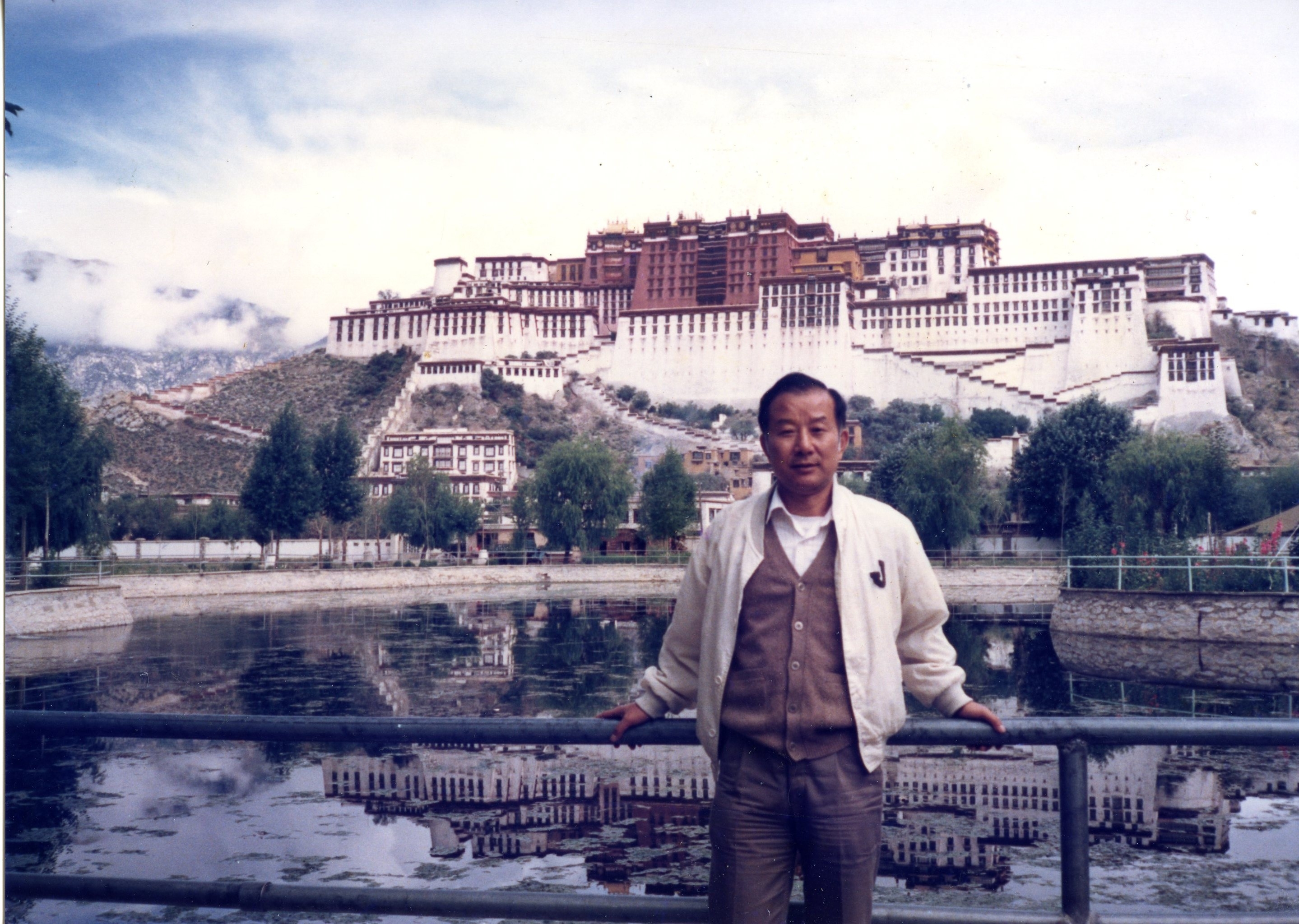 Liu Kuo-sung was photographed in 1987 at the Potala Palace in Lhasa, after his first visit to Tibet, where he attempted to paint the snow-capped mountains using the water-rubbing(shuituo) technique.
Liu Kuo-sung was photographed in 1987 at the Potala Palace in Lhasa, after his first visit to Tibet, where he attempted to paint the snow-capped mountains using the water-rubbing(shuituo) technique.
1986
Futty develops his water rubbing (shuituo) technique and begins exploring and experimenting with his steeped ink (zimo) technique.
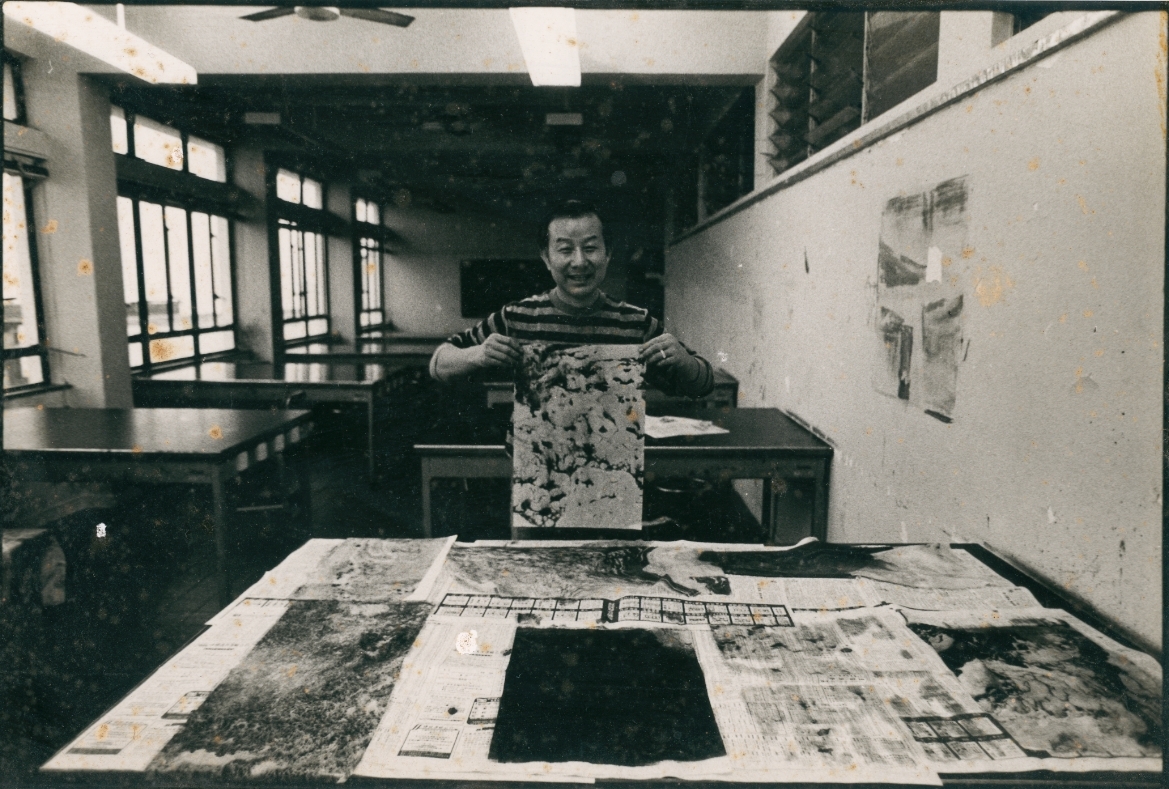 In 1985, Liu Kuo-sung demonstrated the water-rubbing (shuituo) technique in a classroom at The Chinese University of Hong Kong (photographed by Zhou Xulun).
In 1985, Liu Kuo-sung demonstrated the water-rubbing (shuituo) technique in a classroom at The Chinese University of Hong Kong (photographed by Zhou Xulun).
1985
Invited by French artist association Salon de Mai to participate in their salon exhibition in Paris; Liu's painting Deeply inside the Mountain's Breath is featured.
Solo retrospectives of Liu's paintings are held at the Hong Kong Arts Centre and the Museu Luís de Camões in Macau.
Chinese artist Zhou Shaohua's The Construction of Liu Kuo-sung's Art is published by the Hubei Fine Arts Publishing House of Wuhan, China.
Liu is invited by the Central Institute of Arts and Crafts (today the Academy of Arts & Design, Tsinghua University) in Beijing, to be a visiting professor for two weeks; he teaches modern ink painting.
 1985, “Submerge into the Mountain's Breath”, 178.5 x 95.5 cm
1985, “Submerge into the Mountain's Breath”, 178.5 x 95.5 cm
1984
Paintings by Liu Kuo-sung is published by People's Fine Arts Publishing House of Beijing, China.
1983
Has solo exhibitions at the National Art Museum of China (NAMOC) in Beijing and the Jiangsu Provincial Art Museum in Nanjing; the show eventually tours 18 locations in China over the course of three years. When in Beijing, Liu delivers three public lectures at the Central Academy of Fine Arts at the school's invitation.
Participates in the exhibition Moods of Nature, Hong Kong Arts Centre, Hong Kong.
 Liu's first exhibition at the China Art Museum Hangzhou, Zhejiang, China in Beijing, 1983. Liu with Ai Qing, Li Ke-ran , and Lin Lin
Liu's first exhibition at the China Art Museum Hangzhou, Zhejiang, China in Beijing, 1983. Liu with Ai Qing, Li Ke-ran , and Lin Lin
1982
Holds a solo exhibition at the Nora Eccles Harrison Museum of Art of Utah State University, Logan, Utah, US.
Participates in the exhibitions “The Development of Chinese Painting in the Twentieth Century” organized by Hugh Moss Ltd. in London, England; “Modern Chinese Ink Painting” at East & West Art in Melbourne, Australia; and “Contemporary Vision of Landscape” at the Hong Kong Museum of Art in Hong Kong.
Conrad Schirokauer’s Modern China and Japan is published in England, once again naming Liu a key figure of modern Chinese art and featuring his work “The Metaphysics of Rocks.”
1981
Liu is invited to Beijing for the inauguration of the Research Institute of Traditional Chinese Painting (today the National Academy of Chinese Painting) and exhibits his works for the first time in Mainland China.
Participates in the exhibition Peinture Chinoises Traditionnelles at Musee Cernuschi in Paris, France.
Holds solo exhibition at the Cultural Arts Center, Columbus, Ohio; UMC Fine Art Gallery, University of Colorado, Boulder, Colorado, and Galerie Andree in Costa Mesa, California. all in the USA.
At the invitation of the Bahrain Monetary Agency (now the Central Bank of Bahrain), participates in its “First Asian Arts Festival.”
 The opening dinner of the foundation of the Chinese Painting Research Institute. From the left: Ya Ming, Mr.& Mrs. Li Ke-ran, Mr.& Mrs. Wu Zhuo-ren, 1981.
The opening dinner of the foundation of the Chinese Painting Research Institute. From the left: Ya Ming, Mr.& Mrs. Li Ke-ran, Mr.& Mrs. Wu Zhuo-ren, 1981.
1980
Jointly invited by the Iowa Arts Council and the Illinois Arts Council to become artist-in-residence at the University of Iowa. While in the US, Liu delivers lectures and master classes at various colleges, universities and museums, and on educational television programmes.
Holds a solo exhibition that travels through the Ulrich Museum of Art at Wichita State University in Wichita, Kansas; the University of Arizona Museum of Art in Tucson, Arizona; the Monterey Peninsula Museum of Art in Monterey, California; and the Trisolini Gallery at Ohio University in Athens, Ohio, all in the USA.
1979
Chu-tsing Li 's Trends in Modern Chinese Painting, published in Switzerland, expounds on the Chinese works in The C.A. Drenowatz Collection of Zürich, which includes several of Liu's paintings.
 Liu and his family at home in Iowa, the United States, where he was invited to teach. His elder daughter, Liu Lin-hwei (left) ,son, Liu Lin-shin and the younger daughter, Liu Lin-i (front)
Liu and his family at home in Iowa, the United States, where he was invited to teach. His elder daughter, Liu Lin-hwei (left) ,son, Liu Lin-shin and the younger daughter, Liu Lin-i (front)
1978
Professor at the City University of New York Conrad Schirokauer publishes A Brief History of Chinese and Japanese Civilisations, in which he names Liu as a key figure in modern Chinese art; Schirokauer quotes from the artist's essays and features his paintings.
Serves on the organizing and planning committees for the Taipei Fine Arts Museum in Taipei, Taiwan.
1977
Holds a solo exhibition at the Plymouth State College Art Gallery, New Hampshire, and the art gallery of Occidental College, California, both in the US, as well as the East and West Art Gallery in Melbourne, Australia.
Holds a solo exhibition at East and West Art Gallery in Melbourne, Australia.
Serves as a jury member for the “Contemporary Hong Kong Art Biennial 1977” exhibition at Hong Kong City Hall.
1976
Liu updates his 1965 essay "Discussion on Painting Techniques," originally published in Taiwanese magazine Apollo (Wen Hsing), with these two groundbreaking ideas. This revised version is then published in Hong Kong newspaper Sing Tao Daily (17-19 November 1976), and thereafter in Taiwanese newspaper United Daily News (9-11 January 1979), sending ripples through the art circles of the region.
The 4th InSEA Asia Conference on Art Education is jointly organized by CUHK, the International Society for Education Through Art (InSEA) Asia, and the Hong Kong Committee of InSEA; Liu is elected as the president of InSEA Asia.
The University of California, Berkeley publishes Michael Sullivan's A Short History of Chinese Art; in it, the historian calls Liu an innovator in Chinese art.
1975
Teaches at the School of Art, University of Iowa, USA for a year as a visiting professor, upon their invitation.
CUHK's Department of Extramural Studies mounts an exhibition at Hong Kong City Hall. It showcases works by the inaugural class graduating from the Modern Ink Painting Diploma programme (Modern Chinese Ink Painting Diploma Program). In the foreword for the exhibition catalogue, Liu first puts forward his theories on “overturning the centre tip” and “overturning the brush.”
1974
The book L'art Abstrait 1945-1970, which features Liu's painting Which is Earth?, is published in France.
Participates in the 10th “Asia Modern Art Exhibition” at The Ueno Royal Museum in Tokyo, Japan.
Participates in the exhibition “Contemporary Chinese Painting and Calligraphy” at Yale University Art Gallery in New Haven, Connecticut, USA, which later tours various museums across the country.
1973
The exhibition Paintings of Liu Kuo-sung opens at the Hong Kong Arts Centre.
Liu introduces the Modern Ink Painting Diploma programme (Modern Chinese Ink Painting Diploma Program) at CUHK's Department of Extramural Studies.
British art historian Michael Sullivan praises Liu in his book The Meeting of Eastern and Western Art, affirming the artist's place in art history.
Liu begins extensive experiments with water-rubbing (shuituo).
1972
Appointed Chair of the Department of Fine Arts at CUHK; Liu designs and offers a course on modern Chinese ink painting.
Holds a solo exhibition at The Luz Gallery in Makati City, Philippines.
Mounts a solo exhibition that travels to the Brigham Young University Museum of Art, Provo; the art gallery of the Utah State University, Logan; and the Utah Museum of Fine Arts, Salt Lake City-all in Utah, USA.
Participates in the group show “New Directions in Chinese Painting-11 Contemporary Chinese Artists” organized and circulated by the University of Kansas Museum of Art in Lawrence, Kansas, USA.
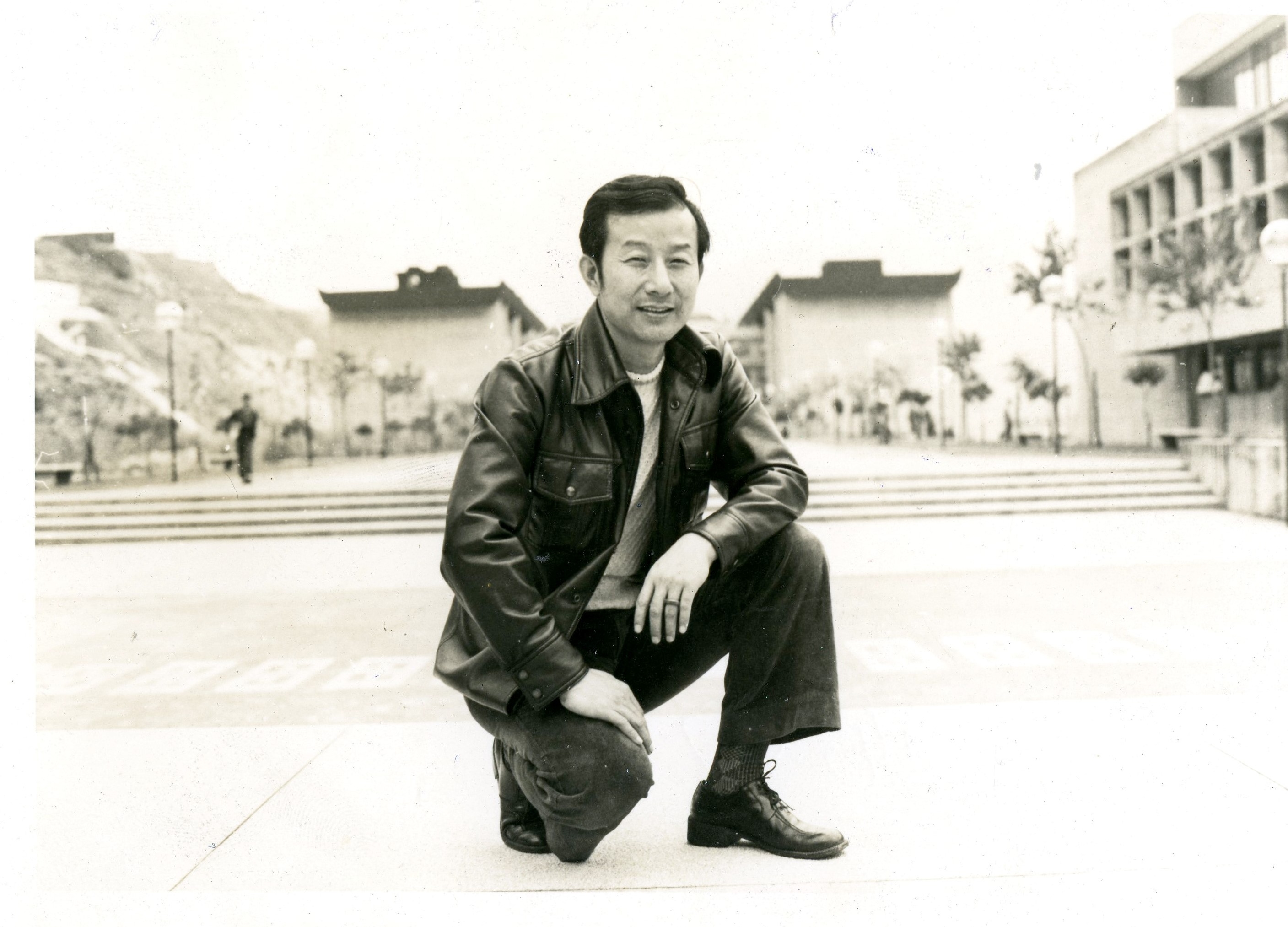 Photographed in 1972, Liu Kuo-sung at the Chinese University of Hong Kong.
Photographed in 1972, Liu Kuo-sung at the Chinese University of Hong Kong.
1971
Moves to Hong Kong to teach at the Department of Fine Arts at The Chinese University of Hong Kong (CUHK).
Has his first solo exhibitions in England at the City Art Gallery Bristol and the London gallery Hugh M. Moss, Ltd.
Participates in the eleventh São Paulo Biennial in Brazil.
1970
The Museum of East Asian Art in Cologne, Germany (Museum für Ostasiatische Kunst Köln) stages the exhibition Paintings of Liu Kuo-sung, and publishes a German edition of Liu Kuo-sung: The Growth of a Modern Chinese Artist by Li Chu-tsing; the show travels to Museum für Kunsthandwerk in Frankfurt the following year.
Teaches art at the University of Wisconsin-Stout, US, for one semester as a visiting professor upon their invitation.
Inspired by Minimal Painting, begins experimenting with acrylics and airbrushing techniques to create his “Moon’s Metamorphosis” series.
 Liu Kuo-sung at his solo exhibition organized by the Museum für Ostasiatische Kunst Köln, Germany, 1970.
Liu Kuo-sung at his solo exhibition organized by the Museum für Ostasiatische Kunst Köln, Germany, 1970.
 The opening reception of Liu Kuo-sung's solo exhibition at the Museum für Ostasiatische Kunst Köln in Germany, 1970. Third from the right is the museum director, Dr. Roger Goepper.
The opening reception of Liu Kuo-sung's solo exhibition at the Museum für Ostasiatische Kunst Köln in Germany, 1970. Third from the right is the museum director, Dr. Roger Goepper.
1969
The one-man show Paintings by Liu Kuo-sung is held at the National Museum of History, Taiwan. An English monograph by US art historian Li Chu-tsing, titled Liu Kuo-sung: The Growth of a Modern Chinese Artist, accompanies the exhibition.
Participates in the tenth São Paulo Biennial in Brazil, as well as Trends in Twentieth Century Chinese Painting at the Stanford Museum of Stanford University, USA.
Begins working on his Space series after being inspired by pictures of planet Earth taken the year before from spacecraft Apollo 8; the first work in the series, Which is Earth?, wins first prize at Mainstream '69: The Second Annual Marietta College International Competitive Exhibition for Painting and Sculpture, held at Marietta College, Georgia, USA.
 1969, “Which is Earth?”, 150 x 78.5 cm
1969, “Which is Earth?”, 150 x 78.5 cm
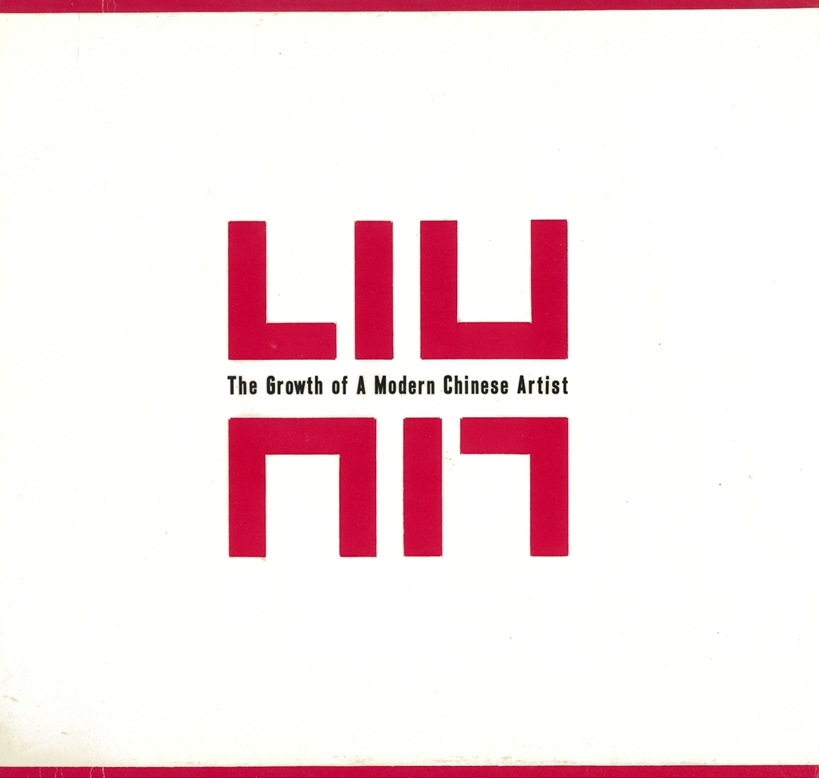 Li, Chu-tsing, Liu, Kuo-sung The Growth of a Modern Chinese Artist, Taipei National Gallery of Art and Museum of History,1969.
Li, Chu-tsing, Liu, Kuo-sung The Growth of a Modern Chinese Artist, Taipei National Gallery of Art and Museum of History,1969.
1968
Named as one of Taiwan's “Ten Outstanding Youths.”
Founds the Chinese Painting Study Society in Taiwan and continues to advocate the modernization of Chinese painting.
Stages a one-man show that travels from the Seattle Art Museum, Washington, to the Taft Museum of Art, Cincinnati, Ohio, both in the USA.
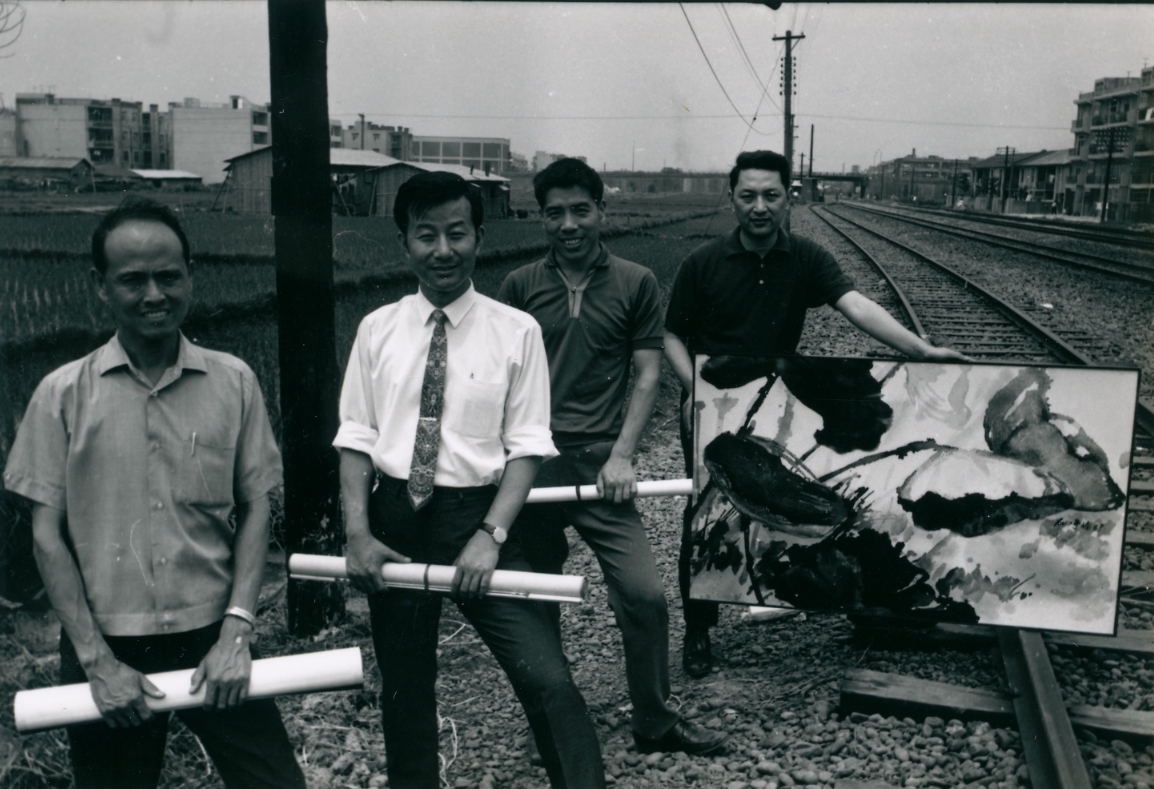 A group photo of the members of the Fifth Moon Group in Zhonghe. From the left: Chen Ting-shih, Liu Kuo-sung, Fong Chung-ray, and Kuo Yu-lun.
A group photo of the members of the Fifth Moon Group in Zhonghe. From the left: Chen Ting-shih, Liu Kuo-sung, Fong Chung-ray, and Kuo Yu-lun.
1967
Stages his first solo exhibition in New York, USA, at Lee Nordness Gallery; it receives a favourable review from New York Times art critic John Canaday. Lee Nordness Gallery begins representing Liu.
Invited to hold a solo exhibition at The William Rockhill Nelson Gallery of Art (now the Nelson-Atkins Museum of Art) in Kansas City, Missouri, USA.
Leaves the US for Europe in May, and spends five months there before returning to Taipei in October, where he takes up a teaching position at Chung Yuan Christian College of Science and Engineering (today Chung Yuan Christian University).
1966
Authored by Chu-tsing Li and Thomas Lawton, the English edition of Liu's first exhibition catalogue, Paintings by Liu Kuo-sung is published by the National Museum of History, Taiwan.
Liu's second collection of essays Copying, Drawing, Creating, is published by Wen Hsing Bookstore in Taipei, Taiwan.
Receives a two-year travel grant from the John D. Rockefeller III Fund on the recommendation of Chinese art historian Chu-tsing Li; Liu studies printmaking at the University of Iowa for three months, then travels the USA for four months, before spending nine months in New York.
Has his first-ever solo exhibition in the US at Laguna Beach Art Association Gallery (now Laguna Art Museum) in Laguna Beach, California, USA.
Participates in the group exhibition The New Chinese Landscape, which travels to leading museums and galleries throughout the USA over the course of two years.
 Liu Kuo-sung's first solo exhibition in the USA, at Laguna Beach Museum of Art, California, 1966. Liu and Museum Director, Dr .Armstrong (front)
Liu Kuo-sung's first solo exhibition in the USA, at Laguna Beach Museum of Art, California, 1966. Liu and Museum Director, Dr .Armstrong (front)
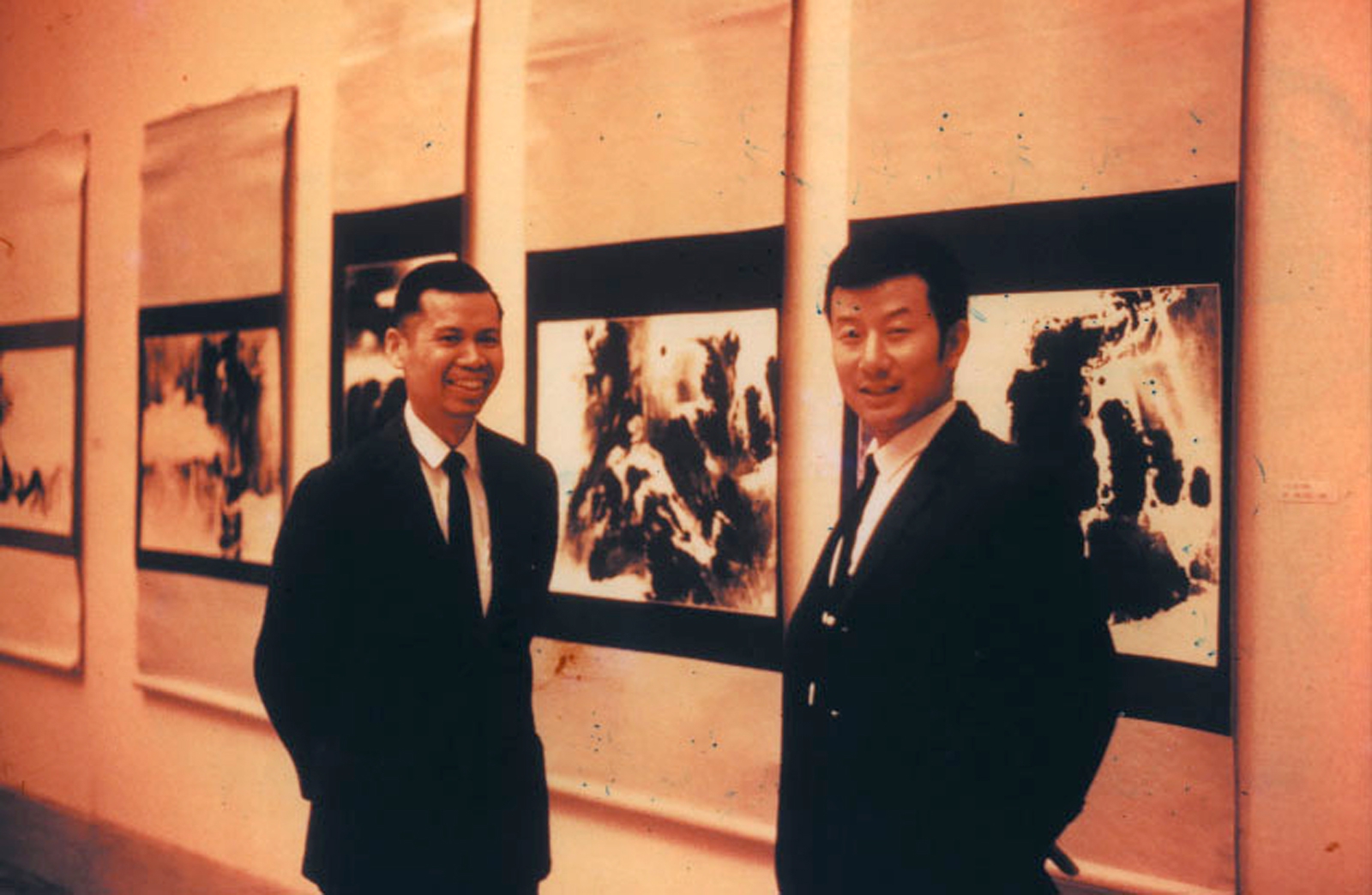 Liu Kuo-sung with Professor Chu-tsing Li at solo exhibition at the Nelson Atkin Gallery, Kansas, USA, 1966.
Liu Kuo-sung with Professor Chu-tsing Li at solo exhibition at the Nelson Atkin Gallery, Kansas, USA, 1966.
1965
Liu's first monographic exhibition opens at the National Center of Arts (now the National Taiwan Arts Education Center).
Participates in the traveling show “Asia Pioneer Artist,” which tours through ten Asian cities.
Liu's first collection of essays, The Road to Modern Chinese Painting, is published by Wen Hsing Bookstore in Taipei, Taiwan.
 “The Road to Modern Chinese Painting”was published by Wen Hsing Bookstore in Taipei, 1965.
“The Road to Modern Chinese Painting”was published by Wen Hsing Bookstore in Taipei, 1965.
1964
Through the introduction of his friend Yu Kwang-chung, Chinese art historian Chu-tsing Li pays a visit to Liu’s studio and is deeply moved by his painting “Wintry Mountains Covered in Snow.”
Participates in the traveling show “Modern Chinese Paintings Exhibition,” which tours through 14 countries in Africa.
1963
Pioneers the use of rough-fibre cotton paper in ink painting and invents "Kuo-sung Paper," which he uses for his unique technique of "texturing by plucking and flaying."
Liu's work Clouds Know No Emptiness is collected by the Hong Kong Museum of Art, marking the first time his work has been acquired by a museum.
 1963, "Clouds Know no Emptiness". 90 x 30 cm
1963, "Clouds Know no Emptiness". 90 x 30 cm
1962
Participates in the 6th Fifth Moon Annual Exhibition. The show was also called Chinese Modern Paintings Exhibition, and is slated to travel the USA.
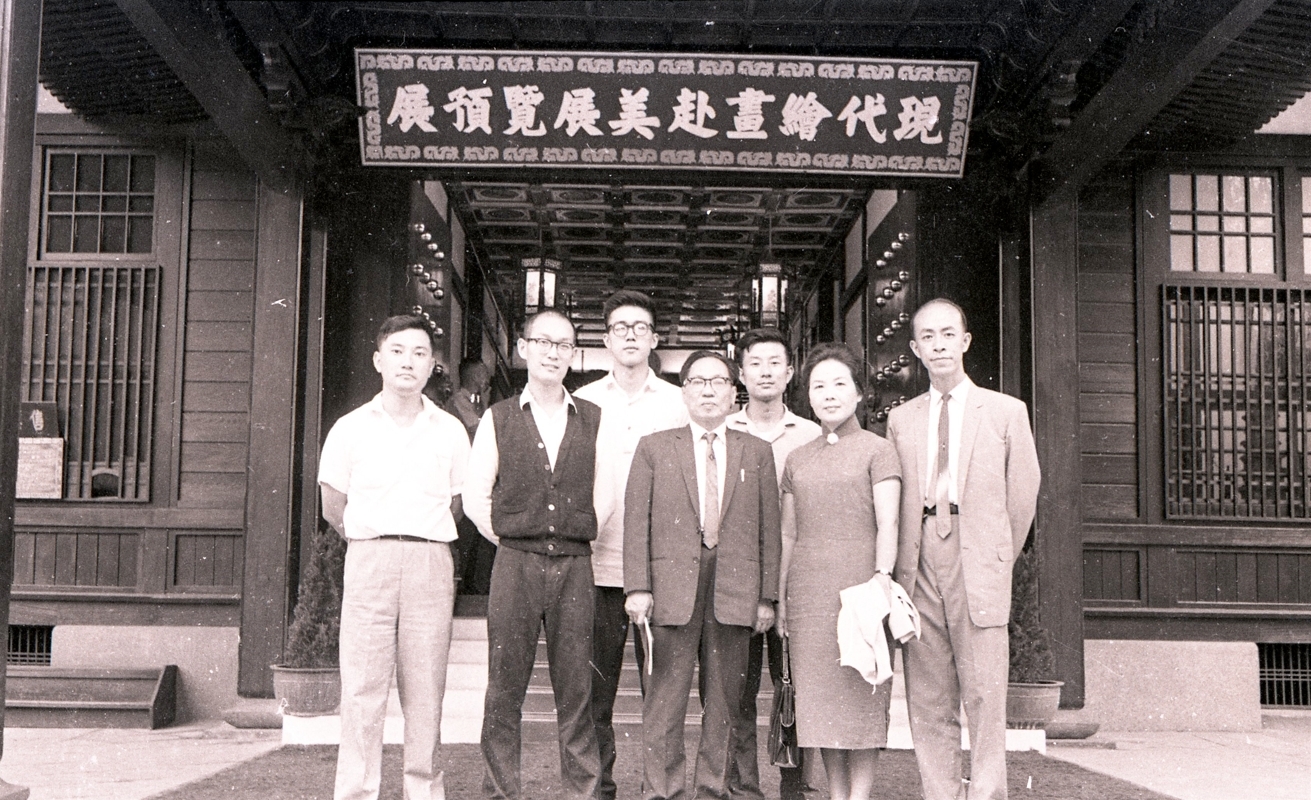 The 6th FIFTH MOON Exhibition & Chinese Mordern Paintings Exhibition were held at the National Historical Museum. From left: Chuang Che, Peng Wan-chih, Han Hsiang-ning, Liao Chi-chun, Liu Kuo-sung, Sun To-ze, and Yu yu Yang.
The 6th FIFTH MOON Exhibition & Chinese Mordern Paintings Exhibition were held at the National Historical Museum. From left: Chuang Che, Peng Wan-chih, Han Hsiang-ning, Liao Chi-chun, Liu Kuo-sung, Sun To-ze, and Yu yu Yang.
1961
Ms. Lee Mo-hua and he are married.
Participates in the sixth São Paulo Biennial in Brazil.
Abandons painting in oil on canvas and returns to using ink and paper, spearheading the modernization of Chinese painting.
Writes an essay to rebut an article titled "The retrogressive trend in modern art" by Hsu Fu-kuan, a Chinese scholar of New Confucianism; this sets off a discursive battle over modern painting.
 Liu Kuo-sung and Li Mo-hua during their wedding in Taipei, June 3,1961.
Liu Kuo-sung and Li Mo-hua during their wedding in Taipei, June 3,1961.
1960
Joins Chung Yuan Christian College of Science and Engineering (now Chung Yuan Christian University) in Taoyuan, Taiwan as a lecturer in its Department of Architecture.
Liu is involved in the establishment of the Modern Chinese Art Center, but the plan is ultimately unsuccessful.
1959
Liu participates in “Brazil's V Bienal de São Paulo” and “France's Première Biennale de Paris: manifestation biennale et internationale des jeunes artistes.” He is described as a “genius” by France's Le Figaro newspaper.
Liu works at the Architecture Department of Tainan Cheng Gong University as teaching assistant for Professor Kuo Po-chuan.
Begins to add turpentine and ink to his oil paintings to simulate the effects achieved in ink-wash paintings.
Becomes one of the editors of Taiwanese monthly Bihui, working with chief editor Yu Tien-tsung.
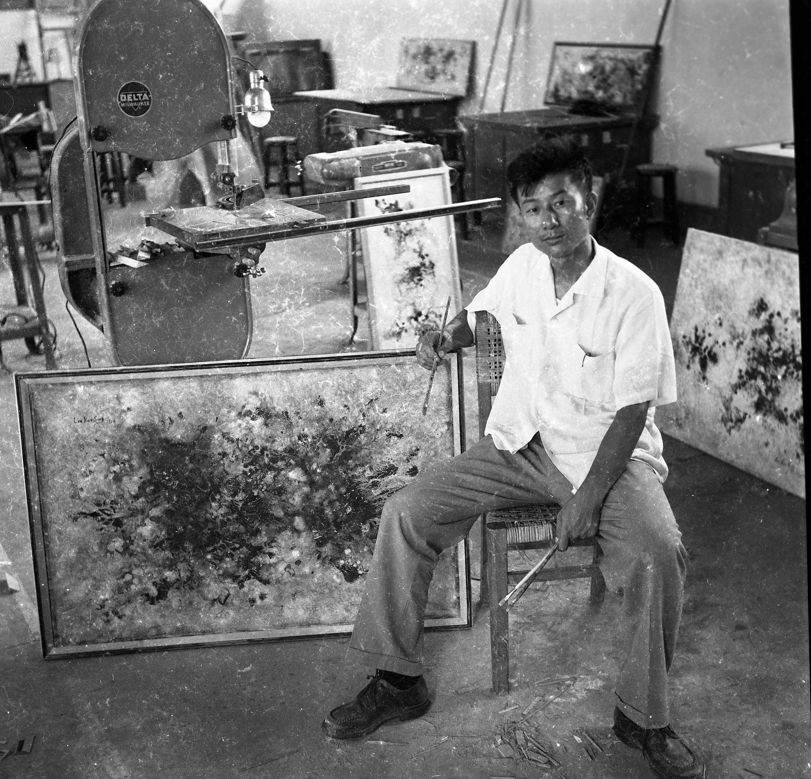 In 1960, Liu Kuo-sung and his oil painting on plaster works were photographed at the Department of Architecture, National Cheng Kung University.
In 1960, Liu Kuo-sung and his oil painting on plaster works were photographed at the Department of Architecture, National Cheng Kung University.
1957
The Fifth Moon Group's first exhibition opens at Zhongshan Hall in Taipei, Taiwan, catalyzing a modern art movement in the region.
Begins experimenting with applying plaster onto canvas for his oil paintings.
Participated in Young Asian Artists Exhibition held in Tokyo, representing Taiwan.
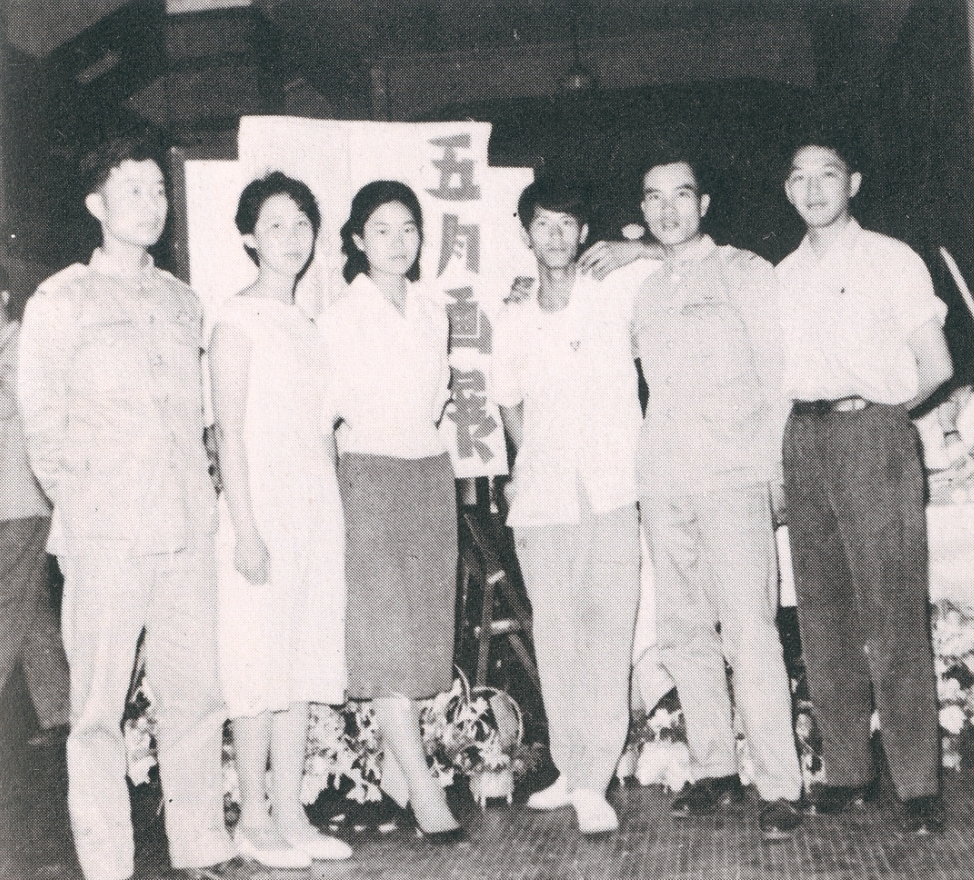 The first “Fifth Moon Annual Exhibition” was held at the Zhongshan Hall in Taipei, with Liu Kuo-sung, Cheng Chung-chuan, Li Fang-chih, Chen Ching-jung, Kuo Tung-jung, and Kuo Yu-lun (from left to right).
The first “Fifth Moon Annual Exhibition” was held at the Zhongshan Hall in Taipei, with Liu Kuo-sung, Cheng Chung-chuan, Li Fang-chih, Chen Ching-jung, Kuo Tung-jung, and Kuo Yu-lun (from left to right).
1956
Organizes the Four-Person Joint Western Painting Exhibition with classmates Li Fang (Li Fangzhi), Kuo Tung-jung and Kuo Yu-lun at NTNU over the summer. Establishes the Fifth Moon Group with the encouragement of his professor, Taiwanese painter Liao Chi-chun.
1955
Liu graduates top of his class from the Fine Arts Department, NTNU; goes on to fulfill a yearlong teaching internship at Keelung Municipal High School.
 Liu receives his BA Degree, 1955.
Liu receives his BA Degree, 1955.
1954
Liu Kuo-sung, under the pen name "Lu Ting," publishes his essay "Why Bring Nihonga into Chinese Painting?" in the Taiwanese newspaper United Daily News; Liu would go on to regularly contribute art criticism to journals, magazines and newspapers.
1952
Authors the short story "Solace after catastrophe"; at his teacher Xie Bingying's encouragement, he submits it to the Taiwanese periodical Zhongxuesheng Wenyi for publication.
1951
Liu is admitted to the Fine Arts Department at the Taiwan Provincial Teachers' College in Taipei, Taiwan (today the Department of Fine Arts, NTNU).
1949
Liu moves to Taiwan with the National Revolutionary Military Orphan School, and subsequently enrolls in the Affiliated Senior High School of Taiwan Provincial Teachers' College in Taipei (today The Affiliated Senior High School of National Taiwan Normal University, HSNU).
 Liu was with the students of the School for the Nationality Army Descendants. From the left were Liu Yu-chun and Xue Xiang-lan, and Li Fu-yi was on the right, 1949.
Liu was with the students of the School for the Nationality Army Descendants. From the left were Liu Yu-chun and Xue Xiang-lan, and Li Fu-yi was on the right, 1949.
1948
Liu qualifies for and is admitted to the National Revolutionary Military Orphan School in Nanjing, China.
1938
Liu's father dies in the Second Sino-Japanese War (1937-1945) when he is six years old. During the war, he travels with his mother and sister through the Chinese provinces of Hubei, Shaanxi, Sichuan, Hunan, Jiangxi and many other places in China; his sister eventually dies from illness.
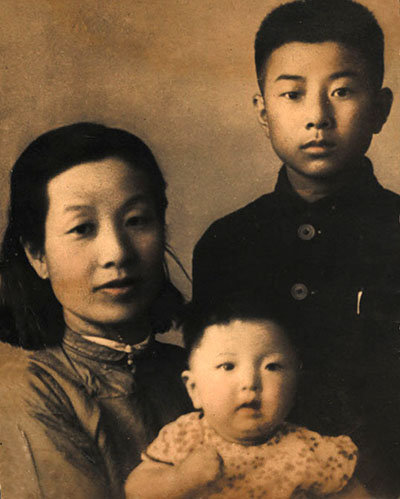 Liu Kuo-sung with his mother and sister in Wuchang, Hubei province, 1946.
Liu Kuo-sung with his mother and sister in Wuchang, Hubei province, 1946.
1932
Liu Kuo-sung is born on April 26, in Bangbu, Anhui Province, China. His ancestral home is in Qingzhou, Shandong Province.